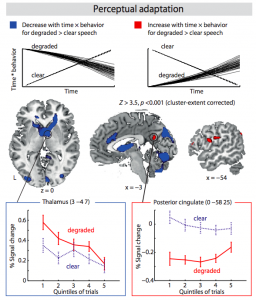We are proud to announce that PhD student Julia Erb just came out with a paper issued in Journal of Neuroscience:
The Brain Dynamics of Rapid Perceptual Adaptation to Adverse Listening Conditions
Grab it here:
- The Journal of Neuroscience, 26 June 2013, 33(26): 10688–10697; doi: 10.1523/JNEUROSCI.4596–12.2013
- Abstract / Full Text
- Full Text (PDF)
Abstract:
Listeners show a remarkable ability to quickly adjust to degraded speech input. Here, we aimed to identify the neural mechanisms of such short-term perceptual adaptation. In a sparse-sampling, cardiac-gated functional magnetic resonance imaging (fMRI) acquisition, human listeners heard and repeated back 4‑band-vocoded sentences (in which the temporal envelope of the acoustic signal is preserved, while spectral information is highly degraded). Clear-speech trials were included as baseline. An additional fMRI experiment on amplitude modulation rate discrimination quantified the convergence of neural mechanisms that subserve coping with challenging listening conditions for speech and non-speech. First, the degraded speech task revealed an “executive” network (comprising the anterior insula and anterior cingulate cortex), parts of which were also activated in the non-speech discrimination task. Second, trial-by-trial fluctuations in successful comprehension of degraded speech drove hemodynamic signal change in classic “language” areas (bilateral temporal cortices). Third, as listeners perceptually adapted to degraded speech, downregulation in a cortico-striato-thalamo-cortical circuit was observable. The present data highlight differential upregulation and downregulation in auditory–language and executive networks, respectively, with important subcortical contributions when successfully adapting to a challenging listening situation.
References
- Erb J, Henry MJ, Eisner F, Obleser J. The brain dynamics of rapid perceptual adaptation to adverse listening conditions. J Neurosci. 2013 Jun 26;33(26):10688–97. PMID: 23804092. [Open with Read]

